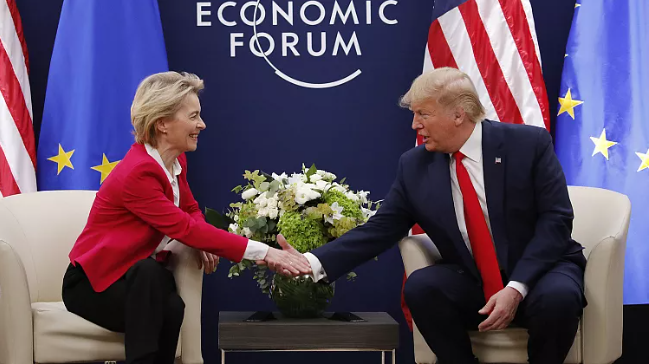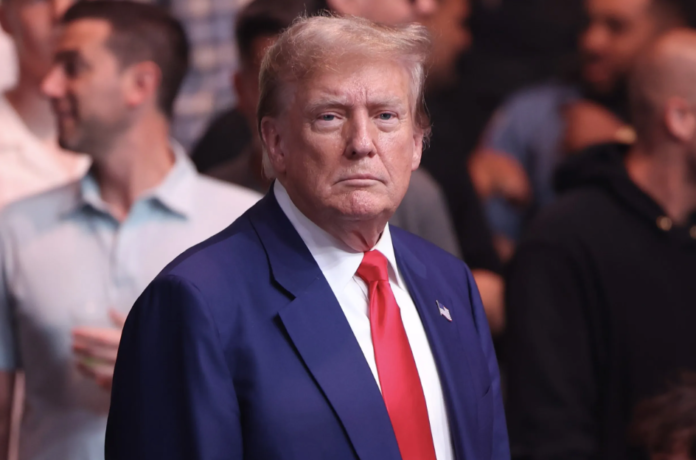Donald Trump has a trade trick he says he won’t hesitate to deploy if re-elected in November: a uniform tariff of up to 20% on all foreign-imported goods. “Outside of love and religion, it’s the most beautiful word there is: tariff,” Trump told a North Carolina crowd on Monday.
A tariff is a levy imposed on foreign goods as they enter a country. The domestic importer is expected to cover the cost, at least on paper.
Donald Trump has threatened to put a 60% tariff on Chinese goods and up to 200% on automobiles made in Mexico’s border regions.
The Republican candidate is depending on the trade weapon to boost domestic US businesses, create employment, and reduce the government deficit through increased tax income.
However, his domestic critics warn that the economic weight of such tariffs could be passed on to American consumers, while allies abroad, notably those in Europe, fear that Trump’s tariffs could have disastrous consequences.
Related: MEPs Approve €35 Billion Loan To Ukraine, Backed By Russian Assets
The EU-US trading relationship is the most valuable in the world, worth around €1 trillion in products and services each year.
The EU benefits the most from trade in products, with a €156 billion surplus last year compared to a €104 billion deficit in services.
A blanket duty of 10% or 20% would make it more expensive for American corporations to import EU goods, potentially reducing EU exports over the Atlantic by up to a third in some sectors, according to the most radical economic forecasts.
Machinery, automobiles, and chemicals, which accounted for 68% of EU exports to the United States last year, would be particularly badly impacted.
It would make Germany, the European Union’s economic powerhouse, particularly vulnerable to shocks, given its reliance on US exports in key areas.
While experts dispute on the degree of the damage, most agree that Trump’s tariffs will have a disastrous impact on Europe’s economy.
Goldman Sachs forecasts that a 10% tariff across the board would reduce the Eurozone’s GDP by 1%. More radical projections suggest that Trump’s tariffs will reduce Eurozone growth by 1.5% by 2028. Such a scenario would push the already struggling economy to the verge of a recession.
Other economists believe that a 10% tax might reduce Germany’s GDP by up to 1.6%, while the impact on other big economies, such as Spain, would be much lower, at 0.5%.

Job losses are one of the potential aftershocks. According to the European Commission, transatlantic trade and investment will directly sustain approximately 9.4 million employment in both the EU and the United States.
However, in recent years, the group has strengthened its trade defensive arsenal, especially in reaction to Trump’s hefty tariffs on €6.4 billion in EU steel and aluminum during his first administration.
The trans-Atlantic trade truce that temporarily ended the Trump-era conflict will expire on March 21, 2025, just two months before the next US administration takes office.
Is a trade war a possibility?
Trump’s promise to impose a 60% tariff on Chinese imports raises the prospect of the EU becoming embroiled in a full-fledged trade war.
“A tariff on Chinese goods entering the United States would inevitably cause many products to be redirected to the European market,” André Sapir, a senior scholar at Bruegel and former economic counselor to European Commission President Romano Prodi, told Euronews.
“The EU would need to respond to that with retaliatory measures. It would need to protect itself.”
Trade tensions between Brussels and Beijing may worsen further as a result of the EU’s decision to slap heavy tariffs on Chinese-made electric vehicles.
“The EU hasn’t been doing what the US has in terms of decoupling from China and reducing imports. This is one of the few things that’s been keeping the European economy afloat,” Zach Meyers, assistant director at the Centre for European Reform (CER), said.
“But how long will the US continue to allow Europe to straddle both horses at the same time? I think it’s a difficult question,” Meyers added.
Analysts believe the bloc would first try to reach an agreement with Trump before imposing retaliatory tariffs.
“The EU and others will be keen to offer Trump a carrot, something to give him the facade of saying that he’s gotten away with a huge success,” Meyers said.
“This is exactly what we saw under the Trump presidency, where you had both the Commission President and Chinese leaders signing these agreements to buy up American goods.”
Trump’s economic advisors may recommend restricting his tariff goals to avoid domestic economic instability. Economists believe the decision will undoubtedly increase inflation, and that US importing corporations may elect to pass on the cost of tariffs to American residents.





